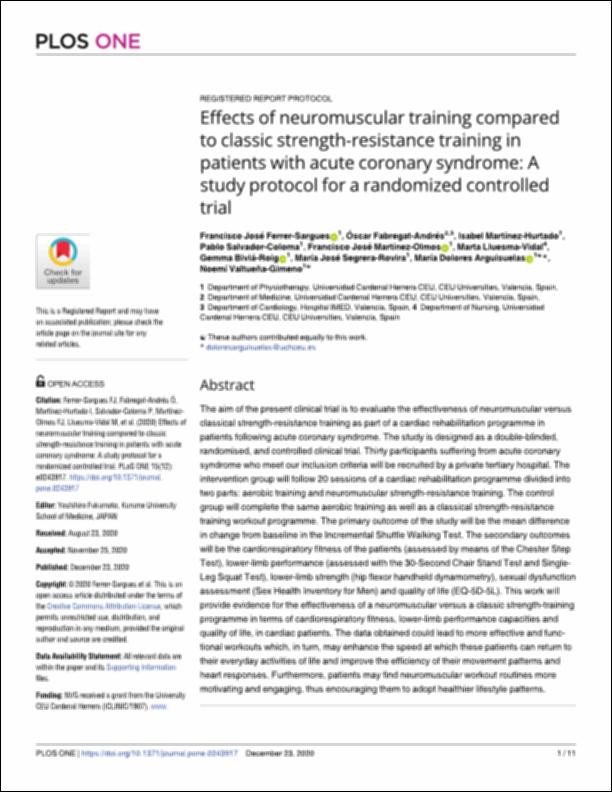Por favor, use este identificador para citar o enlazar este ítem:
http://hdl.handle.net/10637/12647Effects of neuromuscular training compared to classic strength-resistance training in patients with acute coronary syndrome : a study protocol for a randomized controlled trial
| Título : | Effects of neuromuscular training compared to classic strength-resistance training in patients with acute coronary syndrome : a study protocol for a randomized controlled trial |
| Autor : | Ferrer Sargues, Francisco José Fabregat Andrés, Óscar Martínez Hurtado, Isabel Salvador Coloma, Pablo Martínez Olmos, Francisco José Lluesma Vidal, Marta Biviá Roig, Gemma Segrera Rovira, María José Arguisuelas Martínez, María Dolores Valtueña Gimeno, Noemí |
| Materias: | Enfermedad coronaria - Pacientes - Tratamiento.; Muscles - Training.; Músculos - Fuerza - Entrenamiento.; Coronary heart disease - Patients - Quality of life.; Enfermedad coronaria - Pacientes - Calidad de vida.; Coronary heart disease - Patients - Treatment. |
| Editorial : | PLOS. |
| Citación : | Ferrer-Sargues, F.J., Fabregat-Andrés, O., Martínez-Hurtado, I., Salvador-Coloma, P., Martínez- Olmos, F.J., Lluesma-Vidal, M., et al. (2020). Effects of neuromuscular training compared to classic strength-resistance training in patients with acute coronary syndrome: a study protocol for a randomized controlled trial. PLoS ONE, vol. 15, i. 12 (23 dec.), art. e0243917. DOI: https://doi.org/10.1371/journal. pone.0243917 |
| Resumen : | The aim of the present clinical trial is to evaluate the effectiveness of neuromuscular versus classical strength-resistance training as part of a cardiac rehabilitation programme in patients following acute coronary syndrome. The study is designed as a double-blinded, randomised, and controlled clinical trial. Thirty participants suffering from acute coronary syndrome who meet our inclusion criteria will be recruited by a private tertiary hospital. The intervention group will follow 20 sessions of a cardiac rehabilitation programme divided into two parts: aerobic training and neuromuscular strength-resistance training. The control group will complete the same aerobic training as well as a classical strength-resistance training workout programme. The primary outcome of the study will be the mean difference in change from baseline in the Incremental Shuttle Walking Test. The secondary outcomes will be the cardiorespiratory fitness of the patients (assessed by means of the Chester Step Test), lower-limb performance (assessed with the 30-Second Chair Stand Test and Single- Leg Squat Test), lower-limb strength (hip flexor handheld dynamometry), sexual dysfunction assessment (Sex Health Inventory for Men) and quality of life (EQ-5D-5L). This work will provide evidence for the effectiveness of a neuromuscular versus a classic strength-training programme in terms of cardiorespiratory fitness, lower-limb performance capacities and quality of life, in cardiac patients. The data obtained could lead to more effective and functional workouts which, in turn, may enhance the speed at which these patients can return to their everyday activities of life and improve the efficiency of their movement patterns and heart responses. Furthermore, patients may find neuromuscular workout routines more motivating and engaging, thus encouraging them to adopt healthier lifestyle patterns. |
| Descripción : | Este artículo se encuentra disponible en la siguiente URL: https://journals.plos.org/plosone/article/authors?id=10.1371/journal.pone.0243917 |
| URI : | http://hdl.handle.net/10637/12647 |
| Derechos: | http://creativecommons.org/licenses/by/4.0/deed.es |
| ISSN : | 1932-6203 (Electrónico). |
| Fecha de publicación : | 23-dic-2020 |
| Centro : | Universidad Cardenal Herrera-CEU |
| Aparece en las colecciones: | Dpto. Enfermería y Fisioterapia |
Los ítems de DSpace están protegidos por copyright, con todos los derechos reservados, a menos que se indique lo contrario.


